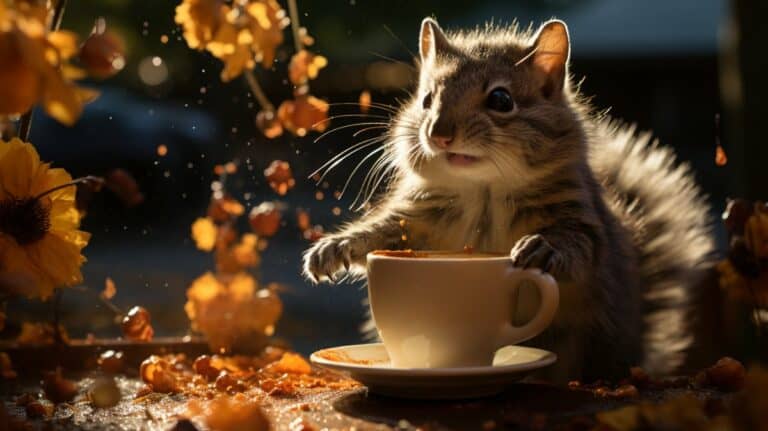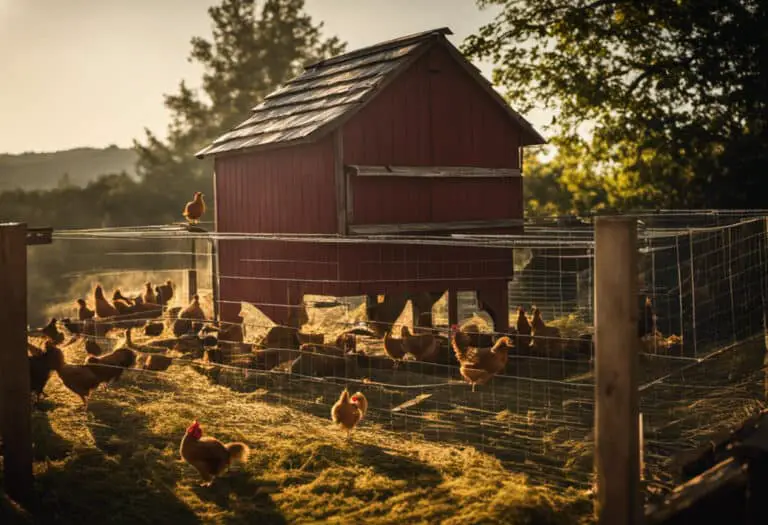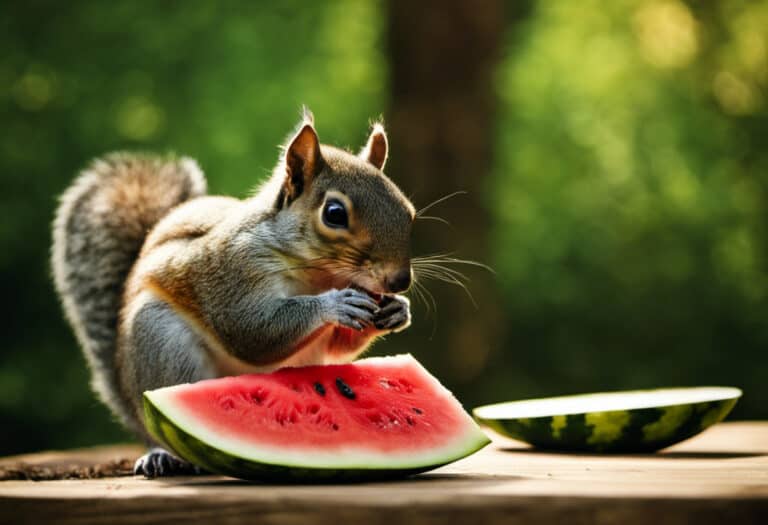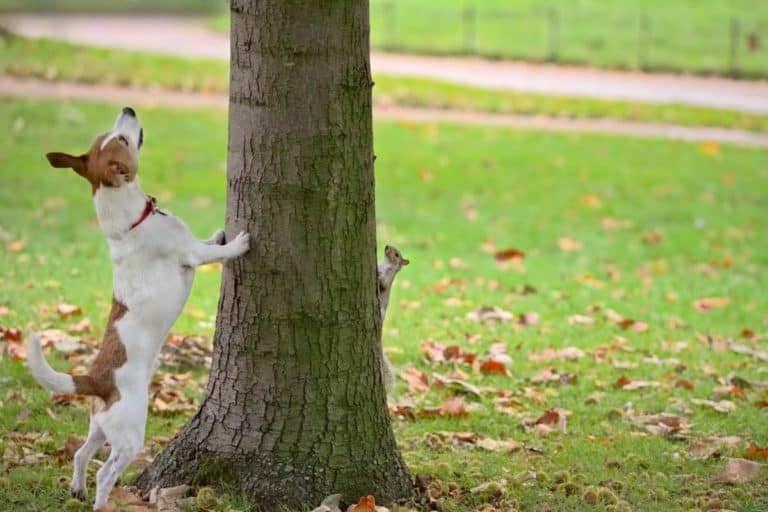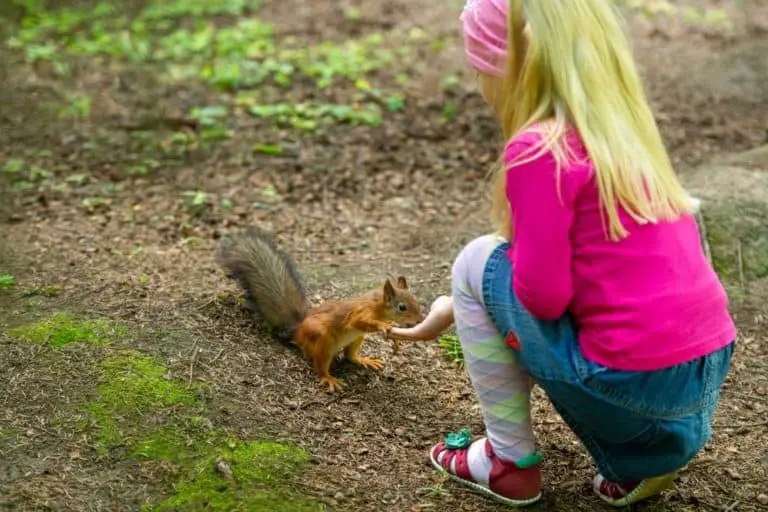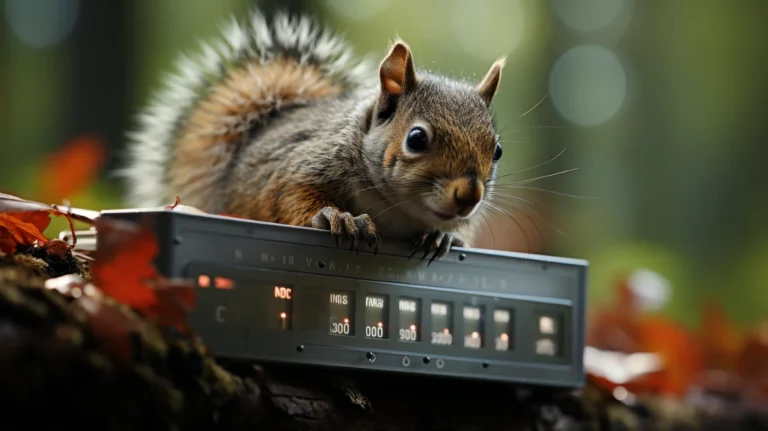Can Squirrels Eat Pecans?
Curious if squirrels can enjoy pecans? You’ve come to the right place. In this article, we’ll explore the dietary habits of these furry creatures and their love for pecans.
Squirrels have a varied diet, and pecans are definitely on the menu. Pecans provide them with essential nutrients like fats, proteins, vitamins, and minerals.
We’ll discuss how pecans fulfill squirrels’ nutritional requirements and explore their eating habits and pecan collection methods.
Keep reading to find out if squirrels can indulge in these tasty nuts.
Key Takeaways
- Squirrels have a varied diet that includes seeds, nuts, fruits, and vegetables, and they can eat pecans.
- Pecans are rich in fat, protein, and various vitamins and minerals, making them a nutritious snack for squirrels.
- Wild squirrels require a balanced diet with essential nutrients, including protein, fat, carbohydrates, vitamins, and minerals.
- Pecan trees provide essential nutrients and calories for squirrels, and squirrels can collect pecans from the ground or directly from the tree.
The Nutritional Benefits of Pecans for Squirrels
Pecans are a nutritious food source for squirrels, providing them with essential fats, proteins, and vitamins. In the squirrel diet, pecans play a significant role in meeting their nutritional needs. These nuts are rich in fats, which provide energy for squirrels to survive in their natural habitat.
Pecans also contain proteins, which are crucial for muscle development and growth.
Additionally, pecans are a good source of vitamins, such as vitamin E, which is essential for the immune system function of squirrels. Moreover, pecans offer minerals like calcium, which helps maintain strong bones and muscles.
Squirrels obtain pecans from the ground or directly from pecan trees, making them a substantial and nutritious part of their diet.
Pecan Trees: A Vital Food Source for Squirrels
Pecan trees provide a variety of essential nutrients and calories for your furry friends to enjoy. Squirrel behavior and pecan tree ecology are interconnected in a way that benefits both species.
Squirrels play a vital role in pecan tree reproduction by dispersing the nuts and aiding germination.
Pecans are an essential food source for squirrels, who actively collect and store them for future consumption. Squirrels exhibit fascinating behavior in pecans as they carefully select and crack open the nuts to access the nutritious kernel.
This behavior satisfies their nutritional needs and contributes to the dispersal of pecan tree seeds, promoting the growth and diversity of pecan tree populations. So, next time you see a squirrel munching on a pecan, remember their essential role in the ecology of pecan trees.
Squirrels’ Eating Habits and Pecan Consumption
Squirrels have a diverse diet, which includes pecans as a significant food source. They can find pecans on the ground or climb trees to collect them.
Pecans provide squirrels with essential nutrients and calories, making them an important part of their eating habits.
Pecans as Squirrel Food
When it comes to their diet, you’ll find that squirrels rely on a variety of foods found in their natural habitat.
One crucial food source for squirrels is pecans. Pecans provide essential nutrients and calories that contribute to squirrel health.
They are rich in fat, protein, and various vitamins and minerals. Pecans offer a nutritious snack for these furry creatures.
However, it’s important to note that pecans are not the only food source for squirrels. They also consume seeds, nuts, fruits, and vegetables.
This variety ensures squirrels receive a balanced mix of protein, fats, carbohydrates, and vitamins.
So, while pecans benefit squirrel health, providing alternative food sources for a well-rounded diet is always good.
| Advantages of Pecans for Squirrels | Alternative Food Sources for Squirrels |
|---|---|
| High in fat, protein, and nutrients | Seeds, nuts, fruits, and vegetables |
| Provide essential calories | Insects, eggs, and small fish |
| Nutritious snack option | A varied diet for optimal health |
Nutritional Benefits of Pecans
You can benefit from the nutritional properties of pecans by incorporating them into your diet. Pecans offer numerous health benefits due to their high nutritional value.
- Pecans are an excellent source of healthy fats, including monounsaturated fats, which can help lower harmful cholesterol levels.
- They’re also rich in fiber, promoting healthy digestion and preventing constipation.
- Pecans contain various vitamins and minerals, such as vitamin E, magnesium, and zinc, contributing to overall well-being.
Including pecans can provide essential nutrients and contribute to a balanced and healthy lifestyle.
Whether enjoyed as a snack or added to recipes, pecans can be a delicious and nutritious addition to your meals.
Feeding Squirrels Pecans?
Incorporating pecans into their diet can provide squirrels with essential nutrients and improve their health.
When natural food sources may be scarce in winter, offering pecans to squirrels can be a great way to support their nutritional needs.
Pecans are rich in fats, proteins, vitamins, and minerals, making them a valuable alternative food source for squirrels. To further understand the nutritional benefits of pecans, take a look at the table below:
| Nutrient | Amount per 100g |
|---|---|
| Protein | 9.2g |
| Fat | 71.9g |
| Carbohydrates | 13.9g |
| Fiber | 9.6g |
Feeding squirrels pecans can provide them with the necessary energy and nutrients to survive through the winter months.
However, it’s important to remember that pecans should be offered in moderation, alongside a balanced diet that includes other natural food sources.
By providing squirrels with alternative food sources like pecans, we can help support their well-being and ensure their survival during winter.
Harvesting Pecans: When and How Squirrels Collect Them
When it comes to harvesting pecans, squirrels have their techniques. They collect pecans from the ground or directly from the tree, depending on their accessibility.
Squirrels are known to be opportunistic and will gather pecans throughout the pecan harvesting season, typically from late August through November.
Pecan Harvesting Techniques
Pecan harvesting techniques involve collecting the nuts from the ground or the tree. Squirrels have adapted to both methods to obtain their precious pecan snacks.
- Ground Collection: Squirrels scavenge the forest floor, searching for fallen pecans. They use their keen sense of smell to locate the nuts they gather and store for later consumption.
- Tree Collection: Squirrels are agile climbers and often scamper up pecan trees to find the nuts. They use their sharp claws and nimble paws to pluck the pecans directly from the branches.
- Pest Control: Squirrels play an essential role in pecan orchards by controlling pests. They eat insects that can harm the trees, helping to maintain a healthy ecosystem.
Understanding squirrel behavior and their harvesting techniques can provide insights into how they interact with their environment and contribute to pest control in pecan orchards.
Seasonal Pecan Availability?
You can find an abundance of pecans during the late summer and fall months. Pecan availability is closely tied to the seasonal feeding patterns of squirrels.
As the pecan harvesting season typically runs from late August through November, squirrels have ample access to this nutritious food source. However, it’s important to note that squirrels may also feast on pecans during the summer months in warm weather.
These small mammals are known to travel between different food sources as the season progresses. Pecans provide squirrels with essential nutrients such as proteins, carbohydrates, vitamins, and minerals.
So, if you’re wondering whether squirrels can eat pecans, the answer is a resounding yes, especially during the late summer and fall months when pecans are readily available.
Feeding Squirrels: Special Considerations for Pecans
Proper storage of pecans is essential to prevent spoilage and attract unwanted pests.
To ensure the freshness and safety of the pecans, store them in airtight containers in a cool, dry place. Risks of contaminated foods, such as mold or bacteria, must be considered. Spoiled foods should never be offered to squirrels, as they can cause health issues.
Squirrels are known for their varied diet; pecans offer essential nutritional benefits. Pecans are rich in fat, protein, and various vitamins and minerals. They provide a nutritious snack for squirrels, supporting their health and growth.
Squirrels have an omnivorous diet and can find pecans on the ground or climb trees to collect them. Pecans serve as an essential food source for squirrels, especially during the pecan harvesting season from late August through November.
Storage and Nutritional Balance: Tips for Feeding Squirrels Pecans
It’s essential to store pecans properly when feeding squirrels to maintain their freshness and nutritional balance. Squirrels have a varied diet, but pecans provide a nutritious snack due to their rich fat, protein content, and various vitamins and minerals.
Wild squirrels require a balanced diet with essential nutrients for optimal health and growth.
Pecan trees are a valuable food source for squirrels, as their leaves, twigs, flowers, bark, nuts, and catkins are rich in proteins, carbohydrates, vitamins, and minerals. Squirrels collect pecans from the ground or directly from the tree during the pecan harvesting season.
When storing pecans for squirrels, keeping airtight containers in a cool, dry place to prevent spoilage and avoid attracting pests is essential. By adequately storing pecans, you can ensure that squirrels can access fresh and nutritious snacks.
Frequently Asked Questions
Are Pecans the Only Type of Nut That Squirrels Can Eat?
Yes, squirrels can eat different types of nuts. While pecans are nutritious for squirrels, they can also eat other nuts like acorns, walnuts, and almonds. Each nut provides varying amounts of fats, proteins, and vitamins for their diet.
Can Squirrels Eat Pecans That Have Fallen on the Ground and Been Exposed to the Elements for a Long Time?
Yes, squirrels can eat pecans that have fallen on the ground, but be cautious. Moldy pecans can be harmful to their health. Squirrels have a varied diet and can find other types of food in the wild.
How Many Pecans Can a Squirrel Eat in a Day?
Squirrels can eat a varying number of pecans in a day, depending on factors like their size and energy needs. Pecans provide essential nutrients and calories, benefiting squirrels’ health and well-being.
Can Squirrels Eat Pecan Shells?
Yes, squirrels can eat whole pecans, including the shells. However, they may struggle to crack open the covers. It’s best to provide shelled pecans to ensure they can access the nut inside easily.
Are There Any Health Risks Associated With Feeding Squirrels Pecans?
Feeding squirrels spoiled pecans can pose health risks. However, providing fresh pecans can offer nutritional benefits. Pecans are rich in fats, proteins, vitamins, and minerals, making them a nutritious snack for squirrels.
Conclusion
In conclusion, pecans are a valuable and nutritious food source for squirrels.
These tiny creatures rely on the varied diet in their natural habitat, and pecans provide them with essential nutrients such as fats, proteins, vitamins, and minerals. Squirrels have adapted to collect and consume pecans, making them a critical part of their diet.
However, it’s important to consider storage and nutritional balance when feeding squirrels pecans.
Pecans, like other nuts, can spoil if not stored correctly, so it’s crucial to ensure they are fresh and free from mold before offering them to squirrels. Additionally, while pecans are a healthy food choice for squirrels, they should be fed in moderation to maintain a balanced diet.
Overall, pecans are a beneficial addition to a squirrel’s diet. Their nutritional content and natural availability make them a suitable food choice for these tiny creatures.
By providing squirrels with pecans, we can support their health and well-being in their natural environment.
